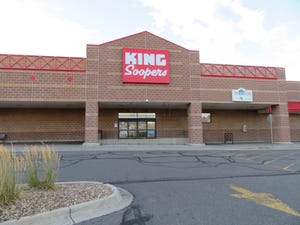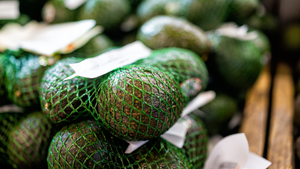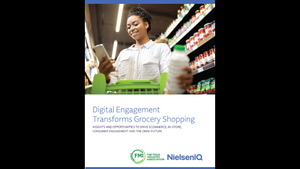EYE ON IMPORTS: THE FOOD INDUSTRY ACTSEYE ON IMPORTS: THE FOOD INDUSTRY ACTS
The Recent Surge of high-profile recalls involving imported goods has sent a collective shudder through the entire food industry. The ongoing problems, particularly with China, present retailers with a dilemma that until now was largely outside of their control. Not anymore. Many large retailers and wholesalers have put a lot more rigor around their specifications for ingredients and product content,
December 1, 2007
LIZ PARKS
The Recent Surge of high-profile recalls involving imported goods has sent a collective shudder through the entire food industry. The ongoing problems, particularly with China, present retailers with a dilemma that until now was largely outside of their control. Not anymore.
“Many large retailers and wholesalers have put a lot more rigor around their specifications for ingredients and product content,” said Mike Griswold, research director of retail strategies for Boston-based AMR Research. “Now, there really is no wiggle room about what will be going into imported products.”
There's currently no maneuvering at Trader Joe's, which specializes in organic foods. Last month it announced a phaseout of single-ingredient foods imported from China, citing concerns that the organic standards on products from that country weren't as stringent as they should be.
Trader Joe's was the first major food retailer to put such a moratorium on Chinese goods, though it may not be the last. Most large supermarket operators and food wholesalers are updating their best practices regarding imports; or, if they don't have guidelines, are busy creating them. New in-house policies are designed to enhance the retailer's ability to more closely scrutinize the quality and safety of the goods they are bringing into the U.S. supply chain, not only for foods but for a wide variety of products, including toys.
So far, China has been the focus of most of these efforts, since its manufacturers have been publicly blamed for exporting children's jewelry and toys laden with lead or coated with coma-inducing chemicals; pet food tainted with the industrial chemical melamine; and diethylene glycol-contaminated toothpaste.
Retailers and their wholesalers are also increasing the number of people who check imported products at various locations, according to Griswold.
“There are more companies applying more human resources to factory inspections, doing a lot more due diligence at factories and also in the fields,” he said. “There are more field inspectors to check the quality of products, and more inspectors at the distribution centers to verify product quality as it is coming into their systems.”
Since the rash of recalls of imported goods, more importers of ingredient supplies, as well as quality-control testing laboratories, have opened inspection offices in countries like China, according to Bill Wolf, president of Wolf, DiMatteo and Associates, a consulting firm in New Castle, Va.
“Importers are doing more laboratory and microbiological testing for potential contaminants and pesticide residues for produce coming in from overseas,” he noted.
“Some retailers are demanding that importers do such tests, and I've heard confidentially that some retailers are also doing their own testing before the product is shipped to their distribution centers. In general, we're seeing a concern among retailers that they have systems that can verify their quality-control processes.”
Griswold estimates that the number of people performing inspections and auditing for food retailers and wholesalers has probably increased by about 15% from the level it was just six or seven months ago.
More retailers are also investing in automated systems that help them better understand the relationship between products and their specifications, in relation to where products are coming from.
“Companies are trying to see whether they can take the intelligence you need to make good decisions about the safety of imported goods and find a way to make those decisions electronically, in a more controlled, automated fashion,” said Mickey North Rizza, research director of supply management at AMR Research. “But, then, they're also realizing that there is nothing better than also having human intervention, which gives you the ability to step back and see what they are really receiving as they check the products out.”
Among the retailers who are doing some form of automated checking, known as Master Data Management or Product Information Management, are Giant Eagle and Trader Joe's in the United States; in Europe there's Delhaize; Leclerc, a France-based grocery chain; Carrefour S.A.; and Tesco, said Griswold.
With an MDM or PIM application, retailers can more effectively monitor the specifications for products they are buying. Griswold added that, based on the level of inquiries from retailers about MDM/PIM applications, “I expect we'll see a 10% to 15% adoption of this technology over the next 12 months.”
In addition to adopting more stringent food safety practices, more food companies that import are also going public with the policies they have put in place to help ensure that imported goods are safe.
At a presentation at a conference in China, Small Planet Foods, the organic division of General Mills, warned of the importance of food safety and quality and indicated it has a quality and regulatory program to ensure that its standards are being met by overseas suppliers, noted Wolf.
Londonderry, N.H.-based Stonyfield Farm, which buys some ingredients from overseas, is another company that has openly talked about having stringent quality-control inspection and testing processes in place.
The fact that there have been a “ton of recalls that we've had in the past couple of months is a cause for encouragement,” said North Rizza.
“What that tells me is that people are going back into the supply chain and asking themselves, ‘What have we got? What do we have to put in place, and what are we finding?’” he noted. “They are addressing the problem on the front end. And it isn't just companies like Mattel, which had problems with toys, but we're seeing it across different products and other industries.”
Imports Reignite COOL Debate
The controversy surrounding imports has reinvigorated the campaign to enact country-of-origin labels for imported foods. It's been required for seafood since 2004, while other commodities such as beef and produce got a reprieve. Their time might be up, however.
“There will be mandatory COOL by 2008 at the latest,” Rep. Rosa DeLauro, D-Conn., declared recently, saying the core issue is about “consumers and their ability to make marketplace decisions.”
If it takes effect, COOL would require country-of-origin labeling on beef, pork, lamb, fresh produce and peanuts.
A number of consumer groups have consistently called for more regulations with regard to country-of-origin labeling. The Center for Science in the Public Interest claims that the relative absence of labeling on U.S. imports and exports of beef and pork makes it hard to identify producers, packers and others in the agricultural industry who are not taking proper safety precautions.
But several trade associations contend that COOL would be costly to implement and would not be effective as a food safety measure because it fails as a traceback tool.
“To assert that any country-of-origin labeling regimen would have an impact on food safety or the integrity of a food product is absurd,” said J. Patrick Boyle, president and chief executive officer of the American Meat Institute.
— LP
Good Advice
Know your suppliers. Make sure you are dealing with people you trust.
Implement a system to monitor standards at the point of production/harvest.
Create an effective internal quality-control system that includes laboratory tests.
Inspect product at the DC level as it comes in.
About the Author
You May Also Like




